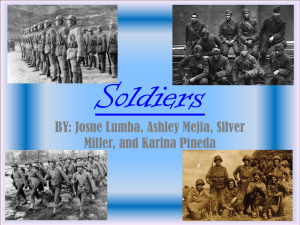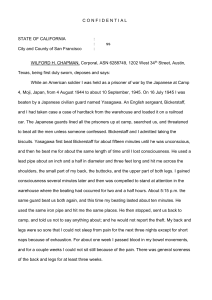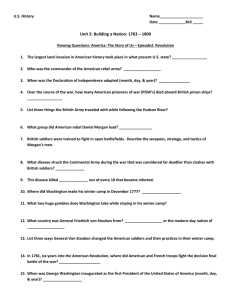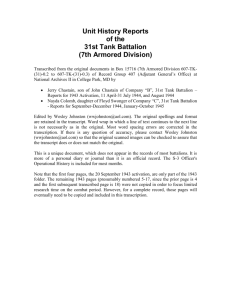Bios
advertisement
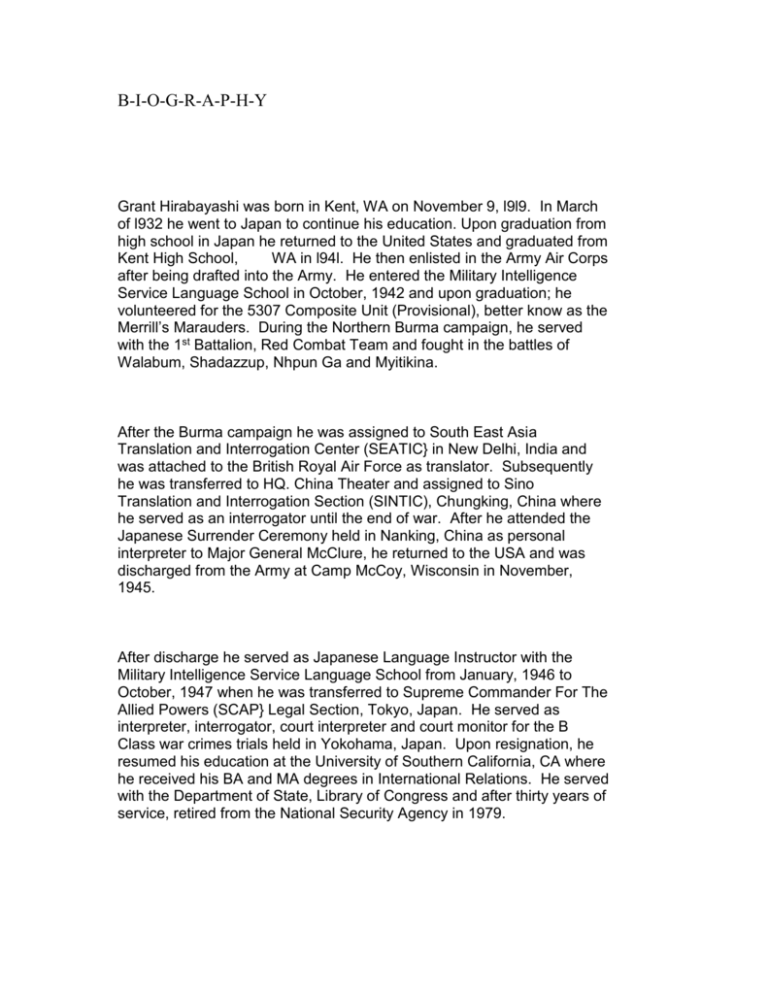
B-I-O-G-R-A-P-H-Y Grant Hirabayashi was born in Kent, WA on November 9, l9l9. In March of l932 he went to Japan to continue his education. Upon graduation from high school in Japan he returned to the United States and graduated from Kent High School, WA in l94l. He then enlisted in the Army Air Corps after being drafted into the Army. He entered the Military Intelligence Service Language School in October, 1942 and upon graduation; he volunteered for the 5307 Composite Unit (Provisional), better know as the Merrill’s Marauders. During the Northern Burma campaign, he served with the 1st Battalion, Red Combat Team and fought in the battles of Walabum, Shadazzup, Nhpun Ga and Myitikina. After the Burma campaign he was assigned to South East Asia Translation and Interrogation Center (SEATIC} in New Delhi, India and was attached to the British Royal Air Force as translator. Subsequently he was transferred to HQ. China Theater and assigned to Sino Translation and Interrogation Section (SINTIC), Chungking, China where he served as an interrogator until the end of war. After he attended the Japanese Surrender Ceremony held in Nanking, China as personal interpreter to Major General McClure, he returned to the USA and was discharged from the Army at Camp McCoy, Wisconsin in November, 1945. After discharge he served as Japanese Language Instructor with the Military Intelligence Service Language School from January, 1946 to October, 1947 when he was transferred to Supreme Commander For The Allied Powers (SCAP} Legal Section, Tokyo, Japan. He served as interpreter, interrogator, court interpreter and court monitor for the B Class war crimes trials held in Yokohama, Japan. Upon resignation, he resumed his education at the University of Southern California, CA where he received his BA and MA degrees in International Relations. He served with the Department of State, Library of Congress and after thirty years of service, retired from the National Security Agency in 1979. His military decorations include Combat Infantry Badge, Presidential Unit Citation with Oak Leaf Cluster and Bronze Star with Oak Leaf Cluster. In July 1997, by order of the Secretary of the Army he was granted and assigned the distinction of Distinguished Member of the 75th Ranger Regiment In July 2004, inducted into the Ranger Hall Of Fame, Fort Benning, GA.. Abridged Biographical Sketch: Susumu Ito July 27, 1919----- Eldest son of an immigrant Japanese from Hiroshima, Japan. At the time of his birth his parents was a share corp farmer in the San Joaquin Delta Region near Stockton, California. He attended rural one room elementary schools and graduated from Stockton High School, his parents having moved into the city to run a Japanese Bath House. After a year in Junior College, he attended an auto mechanic school in San Francisco and soon after he turned 21 was drafted into the US Army in early 1940 almost a year before Pearl Harbor. He initially severed in the Quartermaster Corps Southern California. But was transferred to a station compliment unit at Fort Sill in Oklahoma all this while repairing Army vehicles as a mechanic. When the 442 Regimental Combat Team was formed in Camp Shelby in 1943, he was among the cadre that formed the 522 Field Artillery Battalion of the 442 RGT. He was a motor sergeant in charge of battalion vehicles but was bored of his job so he volunteered to join the instrument section which involved reconnaissance and artillery observation. For his performance in Italy, he received a field commission and served as the forward observer for I Company during the rescue of the Lost Battalion of the 36th Division. After his discharge in 1945, after five years of service, he used up every bit of his GI Bill to complete his undergraduate and graduate degrees in biology earning a Ph.D. in 1954. He accepted a post doc fellowship at the Max Plank Institute in Wilhelmshaven, Germany and then joined the faculty at Cornell Medical School in New York City in 1955. In 1960 his department chairman moved to Harvard Medical School where he was brought along and remained until his retirement in 1990 as Emeritus Professor of Cell Biology and Anatomy. His area of research interest was in the use of electron microscopy in the cell biology of the stomach with special interest in the mechanism of acid secretion. His long standing interest has allowed him to continue in his work in the laboratory to this day where he goes to the lab very early almost every morning and works till at least mid morning. He still does much of his own car repairs and drives long distances--such as to this trip to Houston from Boston. In 1939, after graduating from St. Peter's College in Jersey City, NJ, Marty Higgins joined Squadron C in Brooklyn. NY which was part of the 101st Cavalry (horse) Regiment. They were called up for active duty in January 1941 and sent to Ft. Devins, MA. In November 1942, he received his officer's commission from Ft. Riley Cavalry School, Kansas. Marty was then assigned to the 10th Cavalry called the "Buffalo Soldiers", African American enlisted men, stationed on the CA border. Part of the 2nd Cavalry Division was sent to Oran, Africa. Upon landing, they were told the 10th would become support troops, meaning no combat. Most of the junior officers volunteered to become Infantry Replacements. Marty was assigned to the 36th Texas Division, in the staging area for the invasion of Southern France. He was a platoon leader when they landed on the beach; he took over the Company on September 22nd. When the Battalion was cut off, the last week in October 1944, his peers asked him to take command of the unit. On October 30, this trapped group was rescued by the all Nisei 100/442nd Regimental Combat Team. On December 10, 1944, after fighting for two days and running out of ammo, Marty's company was captured and he was severely wounded. The officers were sent to Oflag 64 in Schubin, Poland. The biggest ordeal was the January march to Germany in subfreezing temperatures. The POW camp in Luckenvalde was liberated by the Russians on April 22nd,1945. Just days before his capture, Marty received his captain bars. On July 1, 1945, he was awarded the Silver Star. Marty was involved in the effort to obtain citizenship for Issei immigrants which was granted in 1952. He left the Reserves during the Korean conflict. No way could he risk letting his beautiful wife, Marjorie, raise their two children alone. Mary Pat was in 1941 and Michael was born in 1951. BIOGRAPHY OF JOE ICHIUJI Joe was born in Salinas, California, one of six children of Kikujiro and Katsu Ichiiuji, who had immigrated from Shimane Prefecture, Japan. in early 1900's. He spent much of his childhood in Pacific Grove, California, where he attended public schools. He was drafted in September 1941 and completed basic training in Camp Roberts, California. However, he was discharged at the convenience of the government. He returned home to help his family with the evacuation. In April 1942, he and his family moved to Reedley, California before being finally placed in Poston Relocation Camp in Arizona in August 1942. In Febraury 1943 he volunteered for the 442nd Regimental Combat Team and took his basic training in Camp Shelby, Miss. and served with Battery A of 522nd Field Artillery Battalion, 442nd Regimental Combat Team. He saw action in Italy, France and Germany in 1944 and 1945 and his unit was involved with the liberation of Jews from one of the subcamps of Dachau concentration camp. He was discharged from the Army in January 1946 and went home to Pacific Grove, California. He attended the Benjamin Franklin University in Washington DC under the GI Bill of Rights and received his bachelors and masters degrees. He entered federal civil service with the Veterans Administratiion and after 37 years of service, he retired from Agency for International Development in 1979 as Deputy Division Chief of Financial Management. He has been active with Washington DC JACL Chapter, Japanese American Veterans Association and Go For Broke National Veterans Association. He is currently active with National Japanese American Veterans Council and National Japanese American Memorial Foundation. He is married to former Asako Tsuda of Cheyenne, Wyoming. They have two children, Karen Ramone, Bedord, NY and Douglas Ichiuji,Front Royal, VA and three grandchildren, Stacy, Julie and BJ. I hope that this is satisfactory with you. Joe
